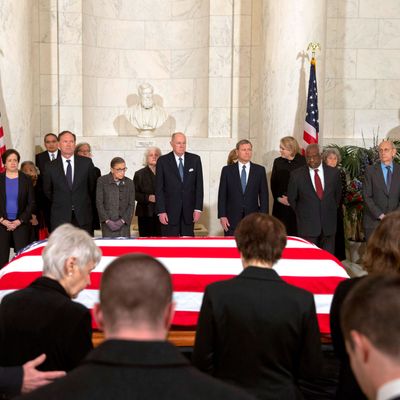
For many years, observers interested in constitutional law have bewailed the fact that the future shape of the Supreme Court is rarely discussed in presidential general elections, despite the presidency’s huge potential influence on the Court’s composition and direction.
It’s interesting, then, that one of the six announced topics for the third presidential debate of 2016 is SCOTUS. This small miracle is probably attributable to the current vacancy on the Court, the 4–4 ideological deadlock it produced, and the refusal of the Republican-controlled Senate to consider confirmation of President Obama’s nominee, Merrick Garland. There is also the subordinate issue that Donald Trump’s promises to appoint a very Scalia-like justice represent perhaps the most powerful lesser-of-two-evils argument for him among otherwise disdainful conservatives — especially white conservative evangelicals focused on the Court’s role in settling abortion, marriage, and “religious liberty” controversies.
So we will be treated to 15 minutes of SCOTUS talk tonight. Bloomberg’s Greg Stohr has an excellent list of six questions — three aimed at each candidate — that moderator Chris Wallace might well ask during this segment.
There is one potential question for each of them that poses particular danger, in my own opinion. Trump will likely be asked to swear on a stack of Two Corinthians passages that he would under no circumstances depart from the published list of SCOTUS-ready candidates (11 announced in May, with another 10 added in September) he prepared with the assistance of the Federalist Society and the Heritage Foundation. If he wavers or indicates a willingness to add some more names later, key conservative opinion-leaders could freak out.
One certain question Clinton will be asked is whether she would renominate Garland to the Scalia vacancy or preserve her right to come up with her own candidate for the Court. And that question could come with a twist: John McCain’s blunt statement this week that Senate Republicans will fight absolutely any nomination Clinton could make for the entire course of her presidency means there is not much point in going with a perceived judicial “moderate” like Garland when a younger, more progressive nominee would attract the same support and arouse the same opposition. But if Clinton does anything tonight other than promise to renominate Garland there will be spin-room shrieking about her constitutional radicalism.
Other potentially tricky questions could include one for Clinton exploring her professed unhappiness with District of Columbia v. Heller, the fairly recent SCOTUS decision establishing an individual constitutional right to own firearms for self-protection. Since gun-lobby folk have tried to create the impression that Heller is somehow the only obstacle to immediate confiscation of everybody’s shooting irons, it could be a good opportunity for Clinton to reiterate her support for private gun ownership with modest regulations to keep them out of the hands of dangerous or unstable people.
Trump has an Achilles’ heel on the subject of eminent domain — the forced sale or confiscation of private property for publicly sanctioned uses. Developer that he is, Trump has praised a SCOTUS decision (Kelo v. City of New London) that expanded the scope of eminent domain. This makes libertarians crazy. That’s trouble Trump does not need.
What we should all hope Wallace does not do tonight is to waste the 15 minutes of precious SCOTUS discussion by simply asking the candidates to explain their general philosophy of constitutional law or the general qualities they would look for in a nominee. That will be an invitation to bland statements about respect for the Constitution and the right kind of judicial temperament, studded with dog whistles to constituencies that care about this or that topic SCOTUS could consider. Yes, there could be entertainment value in listening in awe to the kind of word salad Trump might toss in trying to answer a question about his views on the Constitution or judicial review. But Wallace would do best to stick to the particulars. That should give the handful of truly undecided voters a taste for the very different directions the country might take depending on what happens on November 8.






























